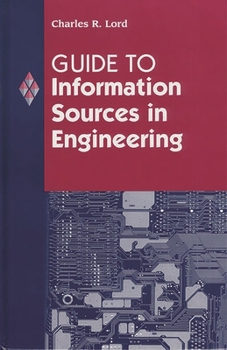< Back to Search Results
Guide to Information Sources in Engineering
The only source that focuses exclusively on engineering and technology, this important guide maps the dynamic and changing field of information sources published for engineers in recent years. Lord highlights basic perspectives, access tools, and English-language resources--directories, encyclopedias, yearbooks, dictionaries, databases, indexes, libraries, buyer's guides, Internet resources, and more. Substantial emphasis is placed on digital resources. The author also discusses how engineers and scientists use information, the culture and generation of scientific information, different types of engineering information, and the tools and resources you need to locate and access that material. Other sections describe regulations, standards and specifications, government resources, professional and trade associations, and education and career resources. Engineers, scientists, librarians, and other information professionals working with engineering and technology information will welcome this research
Format:Hardcover
Language:English
ISBN:B00I5X0GIU
ISBN13:9781563086991
Release Date:August 2000
Publisher:Libraries Unlimited
Length:345 Pages
Weight:1.60 lbs.
Dimensions:1.1" x 6.5" x 9.6"
Customer Reviews
1 rating
Recommended
Published by Thriftbooks.com User , 24 years ago
The number of print and electronic resources in the field of engineering continues to grow at a rapid pace. More than ever engineers need guidance in locating and accessing information. While electronic resources are becoming more common, there is still a need for an up-to-date work that looks at print and electronic resources.This book begins with a useful description of how engineers use information and how they differ from scientists. This chapter is recommended reading for librarians who deal with engineers on a regular basis. The rest of the book is divided into chapters covering the major categories engineering information resources. Only English language resources are covered. Four of the 12 chapters are subdivided by discipline. Internet resources are covered in a separate chapter. The individual entries are relatively short but informative. Most of the print resources covered were published between 1996 and 1999. According to the author, the Internet sites were evaluated for their long-term value and signs of recent updating. For the Internet resources, the author has included the date he last accessed the site. The book's index is a combination subject and title index.Any guide to the literature of broad subject area like engineering is going to be selective based on the author's experience. Users will no doubt browse the index looking for their favorite handbook and wonder why it is not listed. Others will wonder why a particular book is included and some web sites will no longer be accessible but overall the author has done a good job. While this book is intended for engineers, librarians and other information specialists, librarians and others who help engineers locate information will use it most often. This book is strongly recommended.






